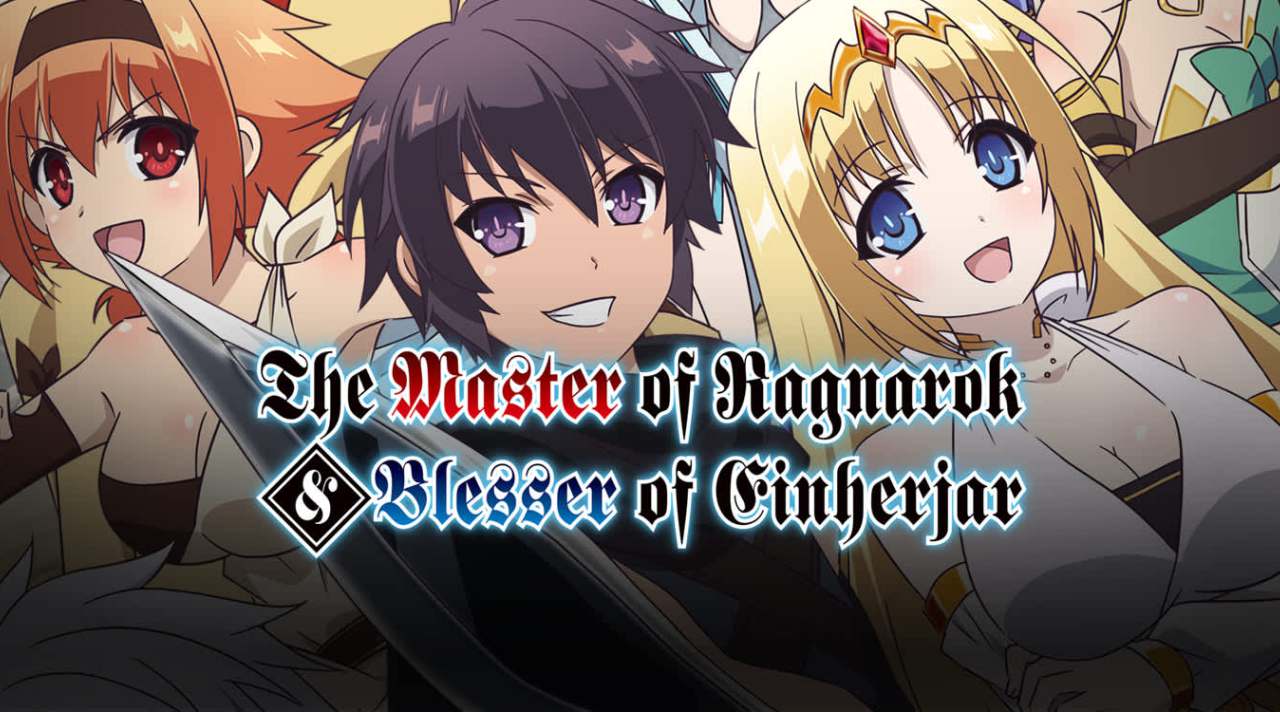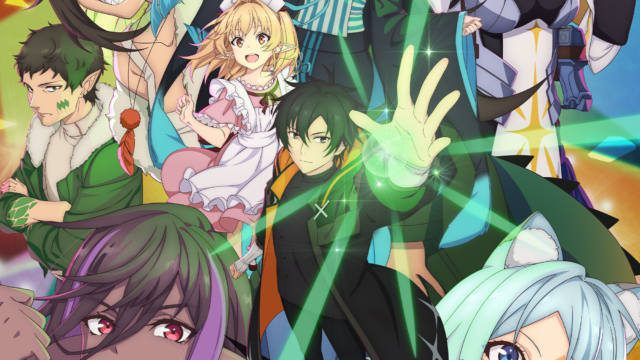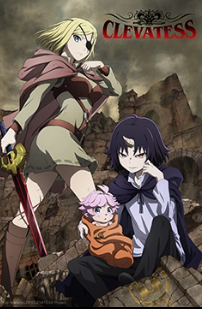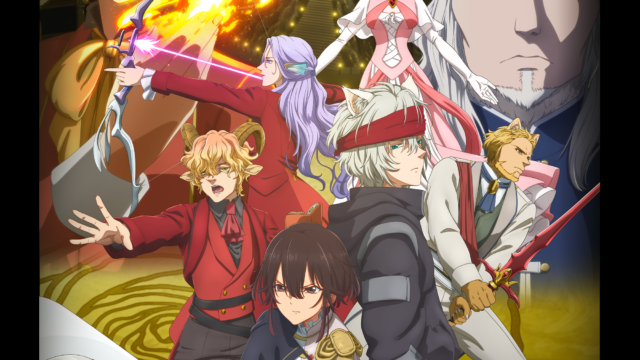English Dub Series Review: The Master of Ragnarok & Blesser of Einherjar
This one isn’t blessed.
Overview
Yuuto Suoh, a teenager from modern-day Japan, is summoned to the fantasy world of Yggdrasil, where he becomes the Wolf Clan’s patriarch. By researching battle formations and artisan techniques on his smartphone, Yuuto is able to ensure the Wolf Clan’s prosperity and lead his people to military victories. But Yuuto is desperate to return to 2018, where his childhood sweetheart Mitsuki is waiting for him. Even worse, the women of the Wolf Clan are all vying to earn his affections. Can Yuuto manage to avoid their advances, fight off the powerful Lightning and Panther clans, and return to Japan? And as his ties to the Wolf Clan grow stronger, will he even want to go home?
Our Take
This show starts out solidly okay. We get introduced to Yuuto and the world of Yggdrasil. The premise seems promising. The female characters are sexualized in annoying, cringe-worthy, dehumanizing ways—but on the plus side, they’re a group of talented ladies with fun personalities, and, when storylines aren’t focused solely on their breasts, I genuinely enjoy watching them. There’s nice animation. There’s the tantalizing promise of gradually-revealed character backstories, of exciting battles and maybe even some romance.
The Master of Ragnarok & Blesser of Einherjar delivers on none of this. As the episodes go on, it becomes increasingly clear that this show is a badly-written, plot-hole-ridden mess with no consistency, no character development, and no interest in doing anything interesting or new. It vacillates wildly from tedious, drawn-out explanations of military history to softcore pornography that’s so unsexy it’s embarrassing. Battles populated by cookie-cutter soldiers are uninventive and difficult to follow. Intriguing plot elements are mentioned once and then dropped, never to be seen again. Dialogue is generic and uninspired, and characters’ emotional reactions carry no resonance whatsoever. The main love story is toxic, and, despite constant rudeness and condescension to the people around him, Yuuto is presented as a pure and perfect hero devoid of any faults. The cultural encounters between Yuuto and Yggdrasil have the potential to be fascinating—they could explore the dynamics between men and women, between Eastern and Western technology, between past and present—but they’re left painfully unexamined because this show isn’t interested in commenting on the world around us. It’s only interested in building up Yuuto’s ego and showing off some sweet anime bewbs.
If you want to know, in greater detail, what didn’t work about this series, here are some selected lowlights:
- We start in the middle of the story. The first light novel begins with Yuuto and Mitsuki visiting a shrine, and readers witness Yuuto’s journey to Yggdrasil firsthand. In episode one of the anime, Yuuto is already the Wolf Clan’s patriarch. We don’t learn how he arrived there until late in the series (and I’m not sure I would have understood it if I hadn’t googled what happens in the light novel). We don’t learn how Yuuto earned the respect of the Wolf Clan, which sounds much more interesting than the nonsense that goes down in the actual show. How did Run grow to respect Yuuto, after distrusting him so much that she challenged him to a battle to the death? Your guess is as good as mine. Apparently, the writers of this show don’t know that conflict makes for a good story, because we open on a Yuuto who is beloved by all, who doesn’t have to prove himself to anyone.
- A “solar-powered smartphone”? Really?
- When Yuuto’s subjects find out that he’s been cheating, that he’s been looking up other people’s ideas instead of inventing his own products and strategies, they literally don’t care. There could have been a confrontation. There could have been a realization that Yuuto isn’t the best person ever to live. Yuuto could have learned something! But nah. In this show, conflict only comes in the flavor of generic villains who hit their swords against Run’s a couple times before Yuuto outwits them. Can’t make him look bad, right?
- God, the military tactics are boring.
- God, the battles are somehow even more boring.
- Everyone in Yggdrasil constantly goes on about how great Yuuto is and how unskilled and primitive they are in comparison. The show just can’t let its female characters be good at things. It’s condescending and irritating.
- The fanservice. I don’t even know what to say about the fanservice. Linnea forces herself on Yuuto because a dream told her to. Felicia washes Yuuto’s back with her breasts. Yuuto’s child slave is considered a possible love interest. The fanservice is mind-blowingly ridiculous and uncomfortable—and, I’ll admit, a little hilarious.
- The title cards before and after the commercial break often contain spoilers for the second half of the episode—or, in other cases, straight-up contradict established canon info. Sometimes, they contain crucial info that’s never relayed at any other point in the show.
- New characters come out of nowhere and die (or become major villains) one second later, and we’re supposed to care about them just like that.
- This show somehow missed the memo where we all agreed that slavery is bad. It presents Effie’s enslavement as a cute quirky character trait rather than a, you know, very serious real-world issue. She loves Yuuto because he’s a kind slaveowner who genuinely cares about her wellbeing despite, uh, enslaving her. Then Effie has some cute elementary school drama. What?
And then there are the plot holes. Boy, are their plot holes. Another list, for your edification:
- Yuuto buys two slaves: Effie and her mother. After that first purchase, her mom is never mentioned again.
- Linnea promises that she won’t take no for an answer and then… she never brings up marriage to Yuuto again.
- Yuuto tells Linnea about a time he miscalculated during a battle, and another character had to pay with her life. Is he talking about the old patriarch? Because that didn’t happen during a battle, and the dub clearly uses “she” pronouns to refer to the girl Yuuto killed.
- Chris and Al are, respectively, a seasoned spy and a trained assassin. Does Yuuto ever end up utilizing their skills in any battle, after promising to do so against the Lightning Clan? No siree.
- Leafa looks exactly like Mitsuki, a fact that’s brought up again and again. In the end, it means nothing. Also, she delights Yuuto and Felicia by telling them that another copper mirror exists in Yggdrasil, and then that never comes up again either.
- They make a huge deal about Yuuto buying Mitsuki a hair accessory, and then we never see it happen.
- The mythology connections. Hoo boy. Mitsuki’s cousin believes that Yuuto may be creating the events that inspired the Norse myths, and apparently, Yuuto is connected to the mythological figures Fenrir and Surtr. This freaks out Mitsuki, because Fenrir dies at the end of his story—not to mention the fact that when Ragnarok comes, Yuuto may go crazy and actually destroy Yggdrasil rather than uniting it. Also, Yuuto’s wife is fated to be the mythological figure Simmara or something. Honestly, Mitsuki learning all this was the highlight of the show for me. It suggested interesting twists and surprises, and planted the idea that events in this show might actually mean something. Of course, none of this ever gets mentioned ever again. That’s right. None of it. We never meet Simmara. Yuuto doesn’t destroy Yggdrasil. And Ragnarok is in the title of the show!
Now, as for what did work… sometimes the dialogue is so over-the-top that its silliness becomes enjoyable. When Yuuto delivers passionate speeches about the ruling, when Run pulls out her katana or shows up on a camel, when Steinthor uses a metal umbrella in battle, I can forget that these scenes belong to a trash show and just enjoy the moment. And for what it’s worth, the characters are genuinely lovable. Mitsuki is delightfully aggressive, Leafa is wonderfully smug, Run is incredibly badass. Chris and Al’s antics are funny from time to time, and there are moments when I even feel for Felicia. One of my favorite genres is the “found family” story, and this show almost works as one of those. It’s kind of heartwarming to watch all these weird and powerful women banding together, to watch Yuuto and Mitsuki find a new home amongst people who love them.
But to be honest, my favorite part of this show was making fun of the fanservice with my loved ones. If you enjoy watching shitty media just to tear it apart, then this might actually be the show for you.


























"There are also other characters that come and go (also owned by the Warner Bros. Discovery conglomerate media company)."
Huh. Is that just referring to other characters from the show itself, or is this implying that the new season is going to have cameos from other WBD IPs